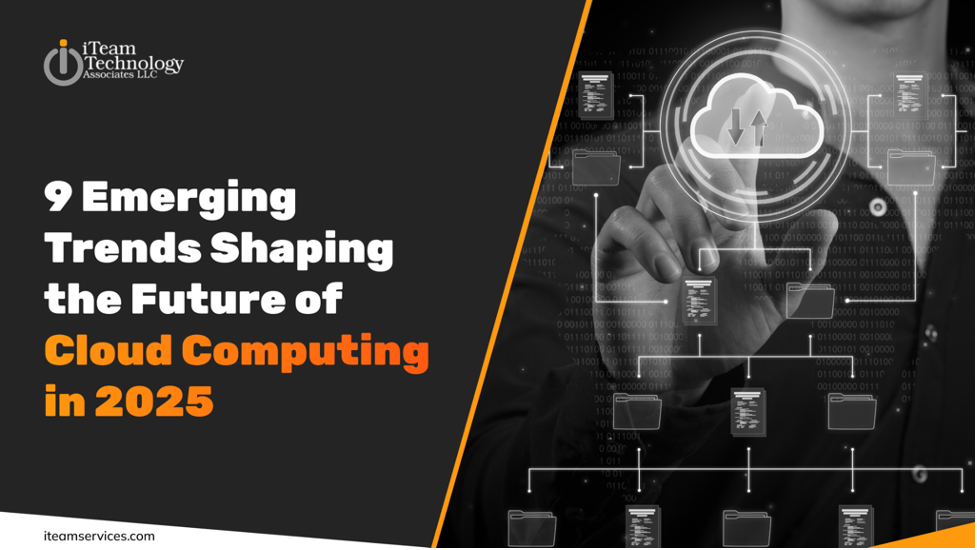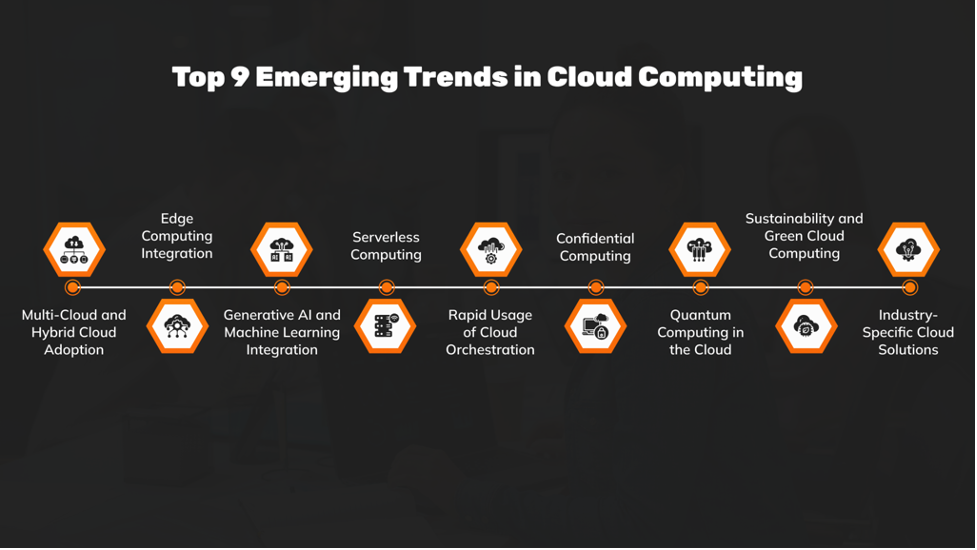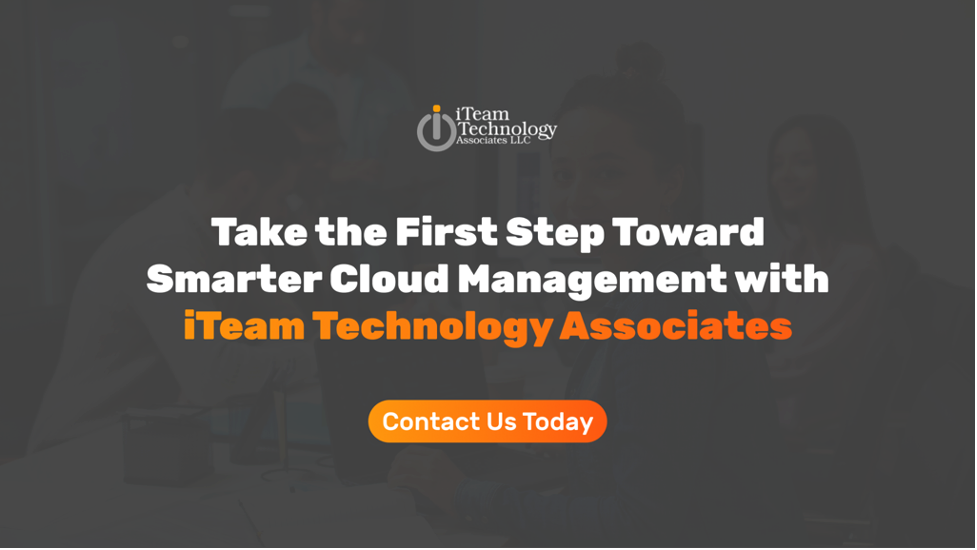
Cloud computing is no longer just an option for businesses; it has become vital to how organizations operate and grow. As of 2023, over 90% of enterprises worldwide rely on cloud-based services, whether public, private, or hybrid solutions.
The rapid growth of cloud technologies reflects their undeniable benefits. According to Fortune Business Insights, the global cloud computing market is projected to expand from $676.29 billion in 2024 to an impressive $2,291.59 billion by 2032, growing at a steady CAGR of 16.5%.
Why is cloud adoption accelerating? The reasons are clear.
Businesses are embracing the cloud for its ability to scale operations efficiently and reduce costs. A Deloitte study reveals that companies using cloud services see an average 15-20% decrease in IT infrastructure costs. Gartner adds that by 2028, more than half of enterprises will rely on industry-specific cloud platforms to fast-track their business objectives.
But the benefits go beyond cost and efficiency. Cloud computing is also making IT more sustainable. Research from the Lawrence Berkeley National Laboratory shows that cloud data centers are about 40% more energy-efficient than conventional on-premises systems, supporting eco-friendly practices that are increasingly important to businesses and their customers.
From small startups to global enterprises, companies use cloud solutions to stay competitive, streamline operations, and adapt to changing market demands. This blog will explore the latest trends shaping the future of cloud computing and discuss how organizations can take advantage of these developments to stay competitive.
Factors Driving Cloud Adoption Across Industries
Here’s a look at the essential factors driving cloud adoption across industries and transforming businesses' operations.
Cost Optimization and Operational Efficiency
Cloud computing allows businesses to shift from a capital expenditure model to an operational expenditure model. Instead of investing in expensive hardware and maintaining on-premise servers, companies pay for what they use in the cloud. This pay-as-you-go model reduces costs and enables businesses to allocate resources and automatically handle updates, scaling, and maintenance, freeing IT teams to focus on strategic projects.
Demand for Remote and Hybrid Work Solutions
The shift to remote and hybrid work has been a major driver of cloud adoption. Companies need secure, scalable platforms to support distributed workforces. Cloud-based tools like Microsoft Teams, Google Workspace, and AWS Workspaces enable employees to collaborate and access resources from anywhere with an internet connection.
Rise of Digital-First Business Models
Many businesses adopt digital-first strategies to meet customer expectations and stay competitive. Cloud computing provides the infrastructure to quickly launch digital products and services and scale operations to handle increased demand. Sectors like e-commerce, healthcare, and fintech depend heavily on the cloud to support their digital efforts.
Top 9 Emerging Trends in Cloud Computing

Let us look at the emerging cloud computing trends shaping its future and changing how businesses use technology.
Multi-Cloud and Hybrid Cloud Adoption
Multi-cloud refers to using services from multiple cloud providers, while hybrid cloud combines public and private clouds. Organizations are increasingly adopting these strategies to avoid vendor lock-in and ensure they are not overly dependent on a single provider. This allows businesses to choose the best service for their specific needs from multiple providers, providing flexibility and cost efficiency.
Businesses are increasingly adopting multi-cloud solutions to optimize performance and achieve seamless scalability. Netflix, for example, utilizes AWS for computing, storage, databases, analytics, and recommendation engines, enabling it to manage massive user traffic efficiently.
Similarly, hybrid cloud solutions are becoming essential for regulated industries that must maintain strict security for sensitive data while leveraging the scalability of public cloud platforms. HSBC, for instance, employs a hybrid cloud strategy to ensure the secure handling of financial data while utilizing public cloud services for non-critical operations.
However, managing multiple platforms increases the risk of vulnerabilities, as different providers may have varying security protocols, ensuring applications and data flow seamlessly across various cloud environments can be complex and require advanced integration solutions.
Edge Computing Integration
Edge computing is about processing data closer to the source where it is generated, such as IoT devices, instead of depending on centralized data centers. This decentralization reduces the time it takes to process and analyze data.
Edge computing significantly reduces latency, making it ideal for applications requiring real-time processing. For instance, autonomous vehicles rely on edge computing to instantly process data from sensors and cameras, enabling them to make split-second decisions.
As more devices connect to the Internet of Things (IoT), the demand for real-time analytics will grow. This synergy will drive innovations in healthcare (real-time monitoring) and manufacturing (predictive maintenance).
Generative AI and Machine Learning Integration
Cloud-based AI services are becoming more popular due to their accessibility and scalability. Companies can use these services without needing in-house AI expertise.
Generative AI is a groundbreaking aspect of artificial intelligence that enables the creation of entirely new content, such as images, text, code, audio, and even videos, using advanced AI models. Unlike AI, which focuses on analyzing and interpreting data, generative AI actively produces original content based on patterns and data it has learned. This technology is supported by sophisticated models like GPT (for text) and DALL-E (for images), which use deep learning to generate realistic and contextually relevant outputs.
Predictive analytics is another application that helps businesses forecast trends and make informed decisions. It is supported by platforms like AWS SageMaker, which simplifies building and deploying predictive models.
Serverless Computing
Serverless computing allows developers to focus solely on writing and deploying code without managing the underlying infrastructure. The cloud provider handles server maintenance, scaling, and provisioning.
Microservices and event-driven applications are used in modern cloud architecture. Microservices, like those used by Netflix, allow for seamless scaling and independent updates by breaking applications into small, manageable modules. Uber uses event-driven applications to respond quickly to triggers, like ride requests, and match them with drivers in real time.
Businesses will depend on pay-per-use models where they need to only pay for their computing power, making it cost-effective. This will expand in areas like IoT, where responsiveness is critical.
Rapid Usage of Cloud Orchestration
Cloud orchestration refers to the automated management, coordination, and integration of cloud computing services and resources. It simplifies complex workflows by automating deployment, monitoring, and scaling across cloud environments.
Orchestration tools help businesses improve efficiency, reduce costs, and scale effectively. By automating routine tasks, companies like Spotify manage workflows and microservices with minimal manual effort. These tools also optimize resource utilization, allowing organizations like Twitter to handle peak workloads during major events without significant cost increases. Additionally, orchestration enables real-time scalability, as seen with Uber, which dynamically scales its platform during high-demand periods like holidays. Cloud orchestration will expand and become essential for organizations seeking to manage diverse and complex cloud environments.
Confidential Computing
Confidential computing is a trend in cloud computing that uses hardware-based Trusted Execution Environments (TEEs) to isolate and protect sensitive data and workloads. It ensures secure data processing, even in environments that might not be fully trusted. Data sovereignty in the cloud ensures that data is stored and processed in compliance with the local laws and regulations of the country where it resides.
Confidential computing enhances security by protecting sensitive operations like financial transactions and healthcare data processing. For example, JPMorgan Chase uses it to secure transactions and safeguard client data. It also helps regulated industries meet strict data privacy requirements, as seen with Pfizer, which ensures compliance with healthcare laws like HIPAA.
This technology is expected to be widely adopted, particularly in sectors like finance and healthcare, as data protection becomes a top priority in cloud computing strategies.
Quantum Computing in the Cloud
Quantum computing, still in its early stages, is making its way into cloud ecosystems through partnerships and initiatives by leading providers. Platforms like AWS Bracket, Azure Quantum, and IBM Quantum provide researchers and organizations access to quantum computing environments via the cloud. These services enable the experimentation and development of quantum algorithms without owning expensive quantum hardware.
Quantum computing in the cloud holds immense promise for solving problems currently infeasible for classical computers. In healthcare, it speeds up drug discovery by accurately simulating molecular interactions, and in finance, it helps with better risk analysis and portfolio optimization. It also improves data security by creating encryption that can resist future quantum threats. Quantum computing could significantly change industries as technology advances by enabling optimization, simulation, and artificial intelligence breakthroughs.
Sustainability and Green Cloud Computing
With the growing emphasis on sustainability, cloud providers are striving to minimize the environmental impact of their operations. Data centers consume vast energy and are optimized to reduce carbon footprint by utilizing advanced cooling techniques and efficient hardware to lower power usage. Powering data centers with solar, wind, and hydroelectric energy. For example, Google Cloud has committed to 100% carbon-free energy by 2030.
Industry-Specific Cloud Solutions
Cloud providers are increasingly offering solutions customized to the needs of specific industries, such as healthcare, finance, and manufacturing. These industry-specific clouds include pre-built tools, compliance frameworks, and features designed to address unique challenges within these sectors.
Cloud platforms like Google Cloud Healthcare API provide tools to process and analyze patient data while ensuring compliance with regulations such as HIPAA. Cloud-based AI solutions are being used to enhance diagnostics and patient care. Platforms like AWS Financial Services Cloud offer tools for fraud detection, real-time analytics, and secure data processing to meet regulatory requirements.
Industry-specific clouds simplify the adoption process for businesses by reducing the need for custom development and compliance management. This accelerates cloud adoption, even in regulated or cautious industries.
iTeam Technology Associates, as a trusted cloud provider, offers the resources, expertise, and vendor platforms essential for achieving your company's goals. By partnering with iTeam Technology Associates, your business can access customized cloud solutions to meet your objectives. These solutions support your current needs and adapt to future technological advancements, promoting sustainable growth and innovation.
Benefits of Partnering with the Right Cloud Service Provider
Choosing a cloud service provider that aligns with your business goals can make all the difference. Partnering with a cloud service provider like iTeam Technology Associates ensures your organization is equipped for future challenges.
At iTeam Technology Associates, we offer tailored solutions to fit your needs, provide a smooth migration process, and manage the technical complexities so your team can focus on what matters most. With expertise and adaptable solutions, they help your business stay secure, efficient, and ready for future growth.
Take the First Step Toward Smarter Cloud Management with iTeam Technology Associates

iTeam Technology Associates offers customized cloud solutions that align precisely with your business needs. From streamlined cloud migrations to secure data management, our cloud services optimize and safeguard your IT infrastructure. Here’s what we offer:
- Custom Cloud Migration Strategies
- Flexible Cloud Solutions
- 24/7/365 Cloud Monitoring & Maintenance
- Cost-Effective Cloud Architecture
- Advanced Compliance Tools
- Robust Cybersecurity Measures
Whether you need cloud backup, high-security computing, or compliance-focused cloud infrastructure, iTeam Technology Associates delivers reliable, proactive cloud solutions to drive your business forward. Discover how our cloud services can support your growth and protect your data.



